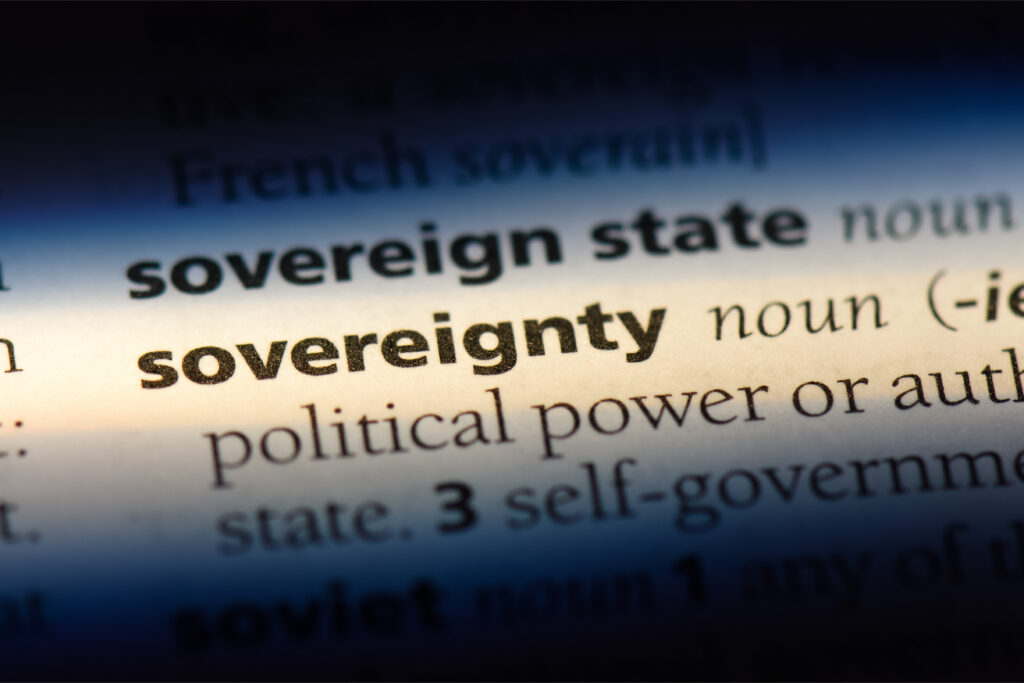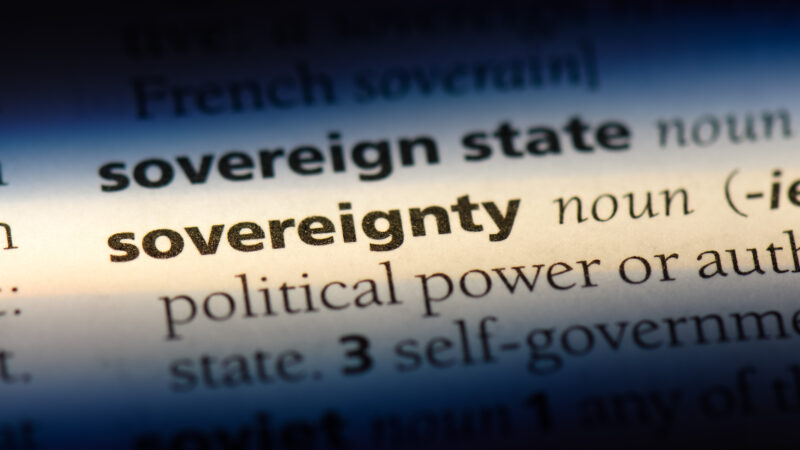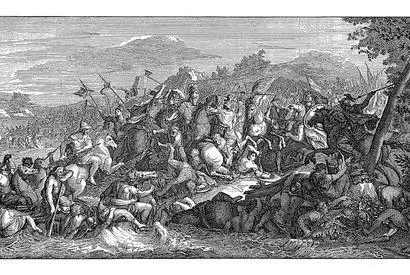Abstract: Much has been said about globalisation. Despite being a multiple-meaning term with controversial connotations, it is almost universally understood to apply to the exogenous environment circumstances of economic and other forces that have been generated in recent decades, owing especially to the reduced costs and time needed for the transit of goods and a similar reduction in costs and time requirements for communication. These factors have led to new frameworks of production, which (in turn) have ended up in expanded and sometimes risky interdependence. We can do little to remedy these; they render obsolete models of sovereignty and independence fictional. Therefore, a robust tension is generated between the traditional way of sovereignty and the international structure.
Bottom-line-up-front: Sovereignty has been largely addressed in various kinds of frameworks and scholastic disciplines, many included in books by IR, political science and legal thinkers with substantial insights. Yet, many of those works target how to describe sovereignty, how it has been driven in the past and how it can be criticised.
Problem statement: How to understand and analyse sovereignty’s relevance in a globalized and interconnected world.
So what?: A careful analysis of the policy framework is necessary, which gets us away from these preconceived “advertising slogans”. The aim is to shed some light on these dilemmas and to describe some framework that needs to be addressed.

Source: shutterstock.com/Casimiro PT
Understanding sovereignty in times of interconnectedness or globalisation and the processes in which it is disputed is quite problematic. Although perceptions vary in content, they nonetheless multiply a uniform conceptual texture of stiff and binary separation on internal and external, national and international entities. The methodical continuity of this structure supported the creation of reality where not only political, social and legal reflection have been formed by this logic of sovereignty but also and above all by derived political processes.
Sovereignty is still central to most reasoning, not only about international relations (IR) and law.[1] The earlier perception of the state´s right to monopolise specific usage of power for its territory and population has been discredited in many ways. However, it is still valued and nurtured by realists who wish to prevent external powers from interfering with the supreme decisions and activities of government.
When someone starts to analyse the idea, it rapidly becomes evident that sovereignty has a great deal of dimensions. The term is oftentimes invoked in a manner predetermined to avoid analysis. Sometimes with individual intention to fend off criticism of external disruptions on the activities of a state or its inner participants and power agents.
The thought of equality of countries is linked to sovereignty vision because of encouragement of the idea that there is no higher authority than the state. So its domination abolishes the motive that there is a higher power, whether external or international (unless consented by the state). One can readily see the rational connection between sovereignty and the foundations and sources of international law. If sovereignty claims that there is no higher authority than the state, then it is argued that no international law standard is legitimate unless the state somehow consented to it. Indeed, international treaties and conventions nearly always comprise the lawful agreement of the nations that accepted them. However, serious questions result in line with various details, such as when a treaty-based international institution sees the development of its operation and jurisprudence over time and assumes the agreement of members even though they opposed that development.
One can readily see the rational connection between sovereignty and the foundations and sources of international law. If sovereignty claims that there is no higher authority than the state, then it is argued that no international law standard is legitimate unless the state somehow consented to it.
There is also customary international law which is theoretically based on the sentiment of approval through the practice of countries, and „Opinio Juris“which is a shortened form of the Latin phrase „Opinio Juris Sive Necessitatis“ (meaning an opinion of law or necessity). For a long time, pundits have discussed the impact on states, but repeatedly in the context of rationalising the vision that consent exists. The ambiguities of these visions are obvious and mold piece of a larger mosaic of criticism against the very existence of customary international law norms.[2] These considerations do not exhaust the complexity of the question and all possible dimensions of sovereignty, although the core dimension is examined in the context of its roles with respect to international law, institutions, relations and related disciplines.
National governments, leaders and officials, as well as special interests proxies, often call out the term sovereignty to anticipate necessary dialogue. Similarly, global networks and elites postulate that “global/globalised is better” (that way downplaying the significance of sovereignty). However, this is not always a decent approach. Today, in the most interconnected world ever, only truly narrow-minded individuals can contrast these two concepts. A careful analysis of the policy framework is necessary, which gets us away from these preconceived “advertising slogans”. The aim is to shed some light on these dilemmas and to describe some framework that needs to be addressed.[3]
Sovereignty has been largely addressed in various kinds of frameworks and scholastic disciplines, many included in books by IR, political science and legal thinkers with substantial insights.
Yet many of those works focus on how to describe sovereignty, how it has been driven in the past and how it can be criticised. However, how can we analyse those matters for their future impact?
The significance and demand for this sort of analytical activity should be apparent and still merits attention. A lot has been said about globalisation. Despite being a multiple-meaning term with controversial connotation, it is almost universally understood to apply to the exogenous environment circumstances of economic and other forces that have been generated in recent decades owing especially to the reduced costs and time needed for the transit of goods and a similar reduction in costs and time requirements for communication.[4] These factors have led to new frameworks of production, which (in turn) have ended up in expanded and sometimes risky interdependence, which we can do little to heal and which renders the obsolete models of sovereignty and independence fictional. Mainly those of communication means (heretofore unknown) are perceived as having a dramatic consequence on the governments’ internal systems. In addition, these factors sometimes ask for moves that no single country can satisfactorily execute and thus request a sort of coordination mechanism between institutions or services. Therefore, a robust tension is generated between the traditional way of sovereignty and the international structure. This tension is persistently evident, some of which are elaborately phrased in the work of juristic establishment such as the dispute settlement body of the World Trade Organization. Exceedingly elaborate jurisprudence of this authority illustrates the tautness between internationalism (globalism) and sovereign state governments´ longing to govern their own democratic constituencies – a tautness that is also visible in a large number of global contexts.
…a robust tension is generated between the traditional way of sovereignty and the international structure.
These reflections propose the necessity for further rethinking (or reshaping) the concept and roles of sovereignty to distinguish these directions from the obsolete and already impracticable models. This essential need is recognised by political thinkers and political scientists in Central and Eastern Europe and any country or region whose political model, characteristic traditions, and perceptions of the world are threatened by various external influences and constant ideological pressures.
Marian Duris is a foreign policy expert with experience in International Relations and security sphere in the United Kingdom and an Advisor to a Member of the European Parliament. He monitors the current affairs to predict trends, legislation process of EU, initiatives of European Commission and background activities that affect countries’ sovereignty. The views contained in this article are the author’s alone and do not represent the views of European Parliament.
[1] Peter Stirk, The Westphalian model and sovereign equality, Review of International Studies, 38(3) (2012): 641-660, doi:10.1017/S0260210511000192.
[2] Curtis A. Bradley and Jack L. Goldsmith, “Customary International Law as Federal Common Law: A Critique of the Modern Position,” Harvard Law Review, 110, no. 4 (1997): 815-76, Accessed August 18, 2021, doi:10.2307/1342230.
[3] Julian G. Ku and John Yoo, Globalization and Sovereignty, 31 Berkeley J. Int’l L. 210 (2013), Accessed August 18, 2021, https://scholarlycommons.law.hofstra.edu/faculty_scholarship/574.
[4] Jeffrey A. Frankel, “Globalization of the Economy,” NBER Working Papers 7858, National Bureau of Economic Research, Inc., 2000.






